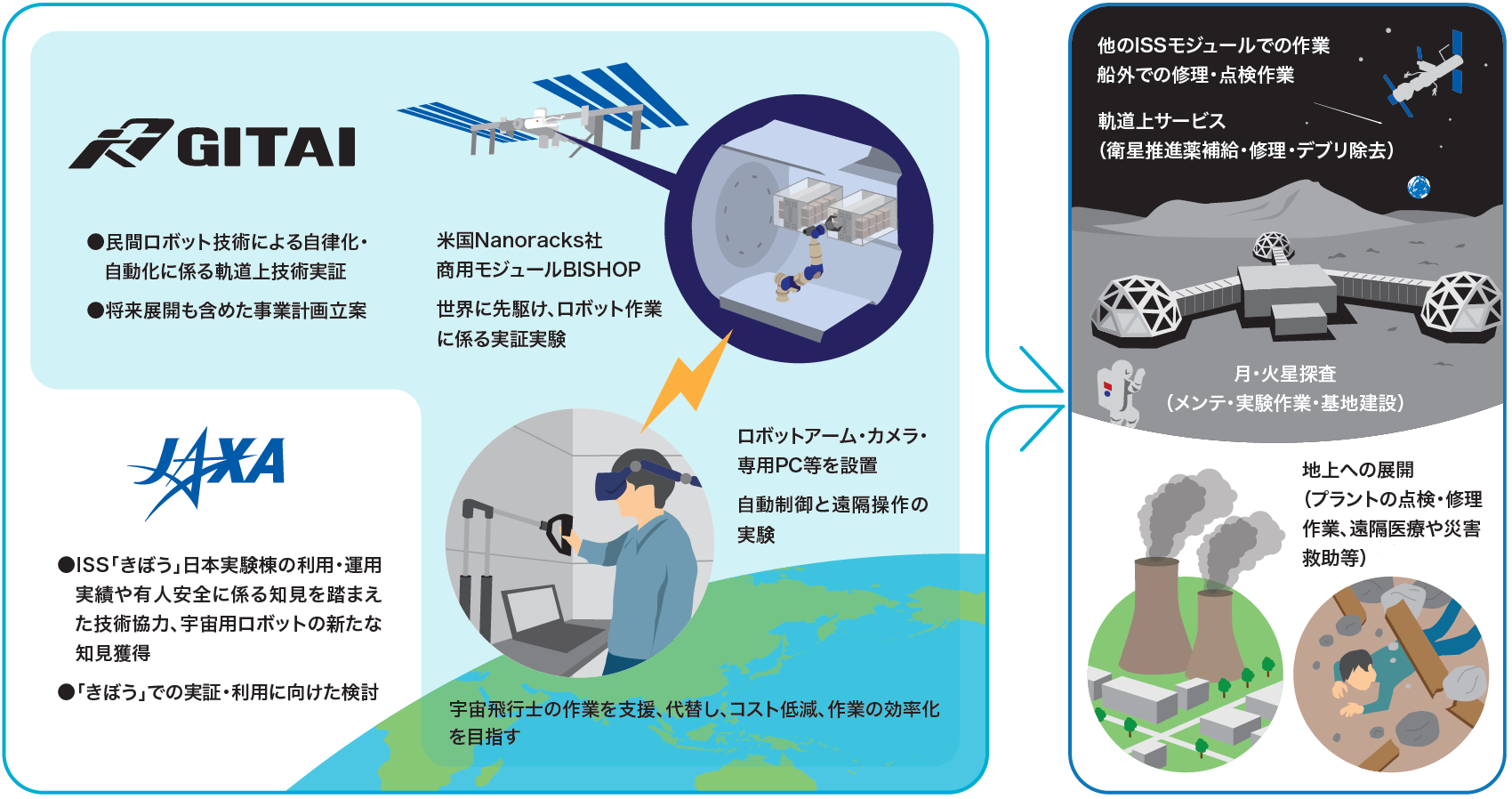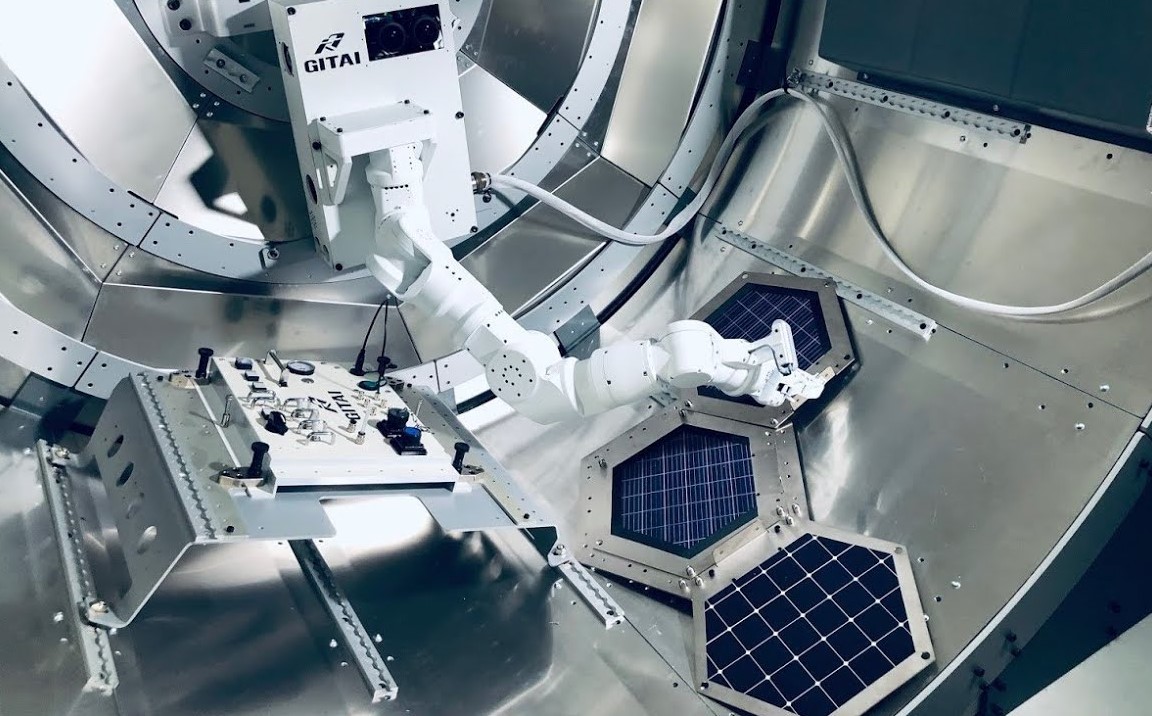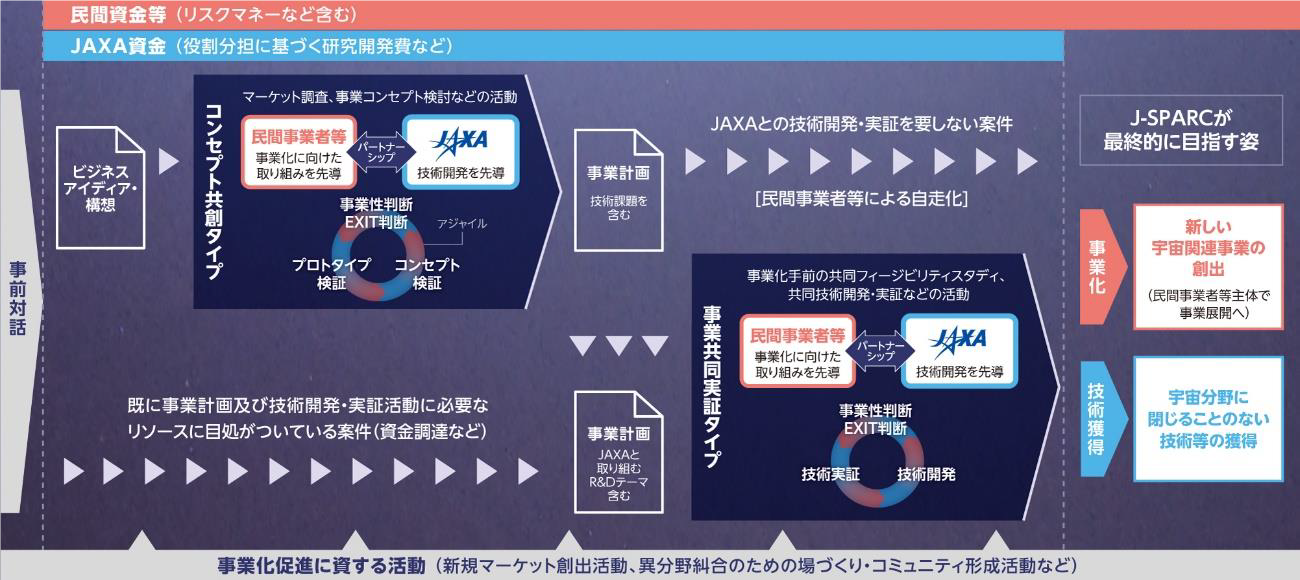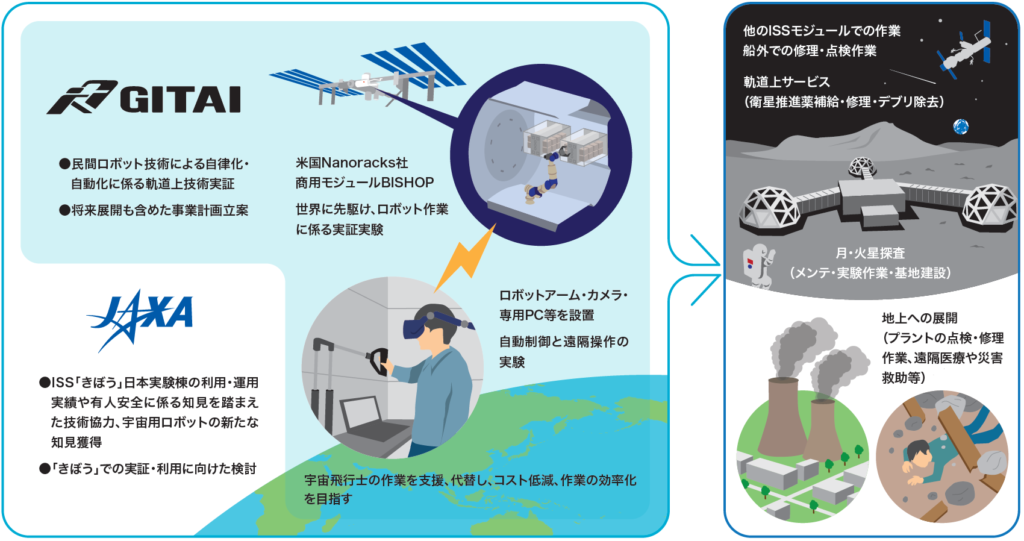Through J-SPARC(※1), GITAI Inc. (Founder & CEO: Mr. Sho Nakanose, hereafter “GITAI”)(※2) and Japan Aerospace Exploration Agency (President: Dr. Hiroshi Yamakawa, hereafter “JAXA”) have entered a partnership to co-create a business concept to provide Robotics as a Service (RaaS) by identifying in-space tasks that need to be robotized, and developing the robotics technology necessary to conduct such tasks.
As the first such commercial entity in the world, in 2021, GITAI will conduct a technical demonstration of autonomous operations and automation of specific tasks with its robot on the International Space Station (ISS). JAXA will support GITAI’s operations through technical cooperation and acquire new knowledge on space robotics. Furthermore, with prospects of activity on the ISS and beyond, GITAI and JAXA will come up with ideas for novel services provided by space robots.

JAXA will acquire new knowledge through technical collaborations with GITAI for their on-board technical demonstration and co-create business concepts based on novel services provided by space robots (© GITAI・JAXA)
In order to realize autonomous operations and automation of tasks inside the ISS such as daily operations, maintenance, scientific experiments, etc., GITAI has built their own mock-up environment of the Kibo module for robot development and verifications. And in 2021, GITAI will become the first commercial company in the world to conduct a technical demonstration of a robot executing versatile tasks (various switches and cable operations, assembly of structures and panels, etc.) in collaboration with Nanoracks inside their Bishop(※3) airlock. The data collected through this technical demonstration will be utilized for future space missions such as the lunar orbiting Gateway and the Artemis program, also for terrestrial applications such as remote medical care and disaster relief.
In order to accelerate utilization of low-earth orbit (LEO) including the Kibo module, JAXA is promoting further commercial use of Kibo. Realizing a robot that can support tasks conducted by the astronauts will contribute not only to raise task efficiency, but also promote further commercial use of Kibo and improve the sophistication of experiments conducted in Kibo. JAXA will support GITAI’s on-orbit technology demonstration by providing technical expertise for verification analysis acquired through Kibo system operations. This will also help JAXA to gain new insights on space robotics and further discussions on future demonstrations and utilization of space robotics in the Kibo module.
Through this business concept co-creation partnership, GITAI and JAXA will accelerate discussions on RaaS and business opportunities provided by space robots, provide a solution for safety and cost issues related to human space activities, and answer the growing demand for tasks to be conducted in space.

Ground experiment image of the GITAI robot inside the Nanoracks Bishop airlock (taken in the ISS mock-up facility@GITAI Tokyo office) © GITAI Inc.
※1:GITAI is a space robotics start-up developing robots that can answer the demand for tasks to be conducted in various realms of space, with a goal to reduce the cost of space labor by 100 times. Focusing on:
1. IVA and EVA (Extra-Vehicular Activity) tasks on space stations;
2. Tasks related to OOS satellites (Docking, refueling, and repairs of existing satellites; debris removal);
3. Various tasks for lunar exploration and lunar base construction;
GITAI will develop robots that can work in the harsh space environment and conduct any kind of task required by the customer. This in turn will bring about a true dawn of the space commercialization age.
https://gitai.tech/
※2:J-SPARC (JAXA Space Innovation through Partnership and Co-creation) is a business incubation program starting with conversations between JAXA and private entities aiming to start a business in space. With a commitment to commercialization from both sides, JAXA and the private entity will collaborate to develop and demonstrate technology with the goal of a business concept in mind. Starting in May of 2018, 20 projects have been kicked off up to date. For business concept co-creation, JAXA will support market research and incubating a business plan, and for business co-verification, conduct joint feasibility studies, technology development and demonstrations leading to commercialization.
http://aerospacebiz.jaxa.jp/solution/j-sparc/

※3:Developed by Nanoracks, Bishop is a commercial airlock module installed on Node 3 of the ISS.
https://nanoracks.com/bishop-airlock/
■Related Links
Ground experiment video of the GITAI robot technical demonstration for versatile tasks inside the Nanoracks Bishop airlock (recorded in the ISS mock-up facility@GITAI Tokyo office)
Video of the business co-creation project between GITAI and JAXA
Comments from GITAI Founder & CEO, Sho Nakanose

We are very excited to have this opportunity to collaborate with JAXA to accelerate the technical demonstration and commercialization of GITAI’s space robotics. In the current space market, there are many players trying to solve the space transportation problem, but very few standing up to the challenge to provide an alternative option for getting work done in space. However, in today’s booming space industry, there is a growing demand for versatile tasks to be conducted in space, but in a more reasonable and non-life-threatening manner. With the success of this technical demonstration, GITAI will be able to provide a significantly cheaper and safer means of conducting various tasks in space, which will bring about a true dawn of the space commercialization age.
Comments from JAXA Director of Management and Integration Department, Human Spaceflight Technology Directorate, Kazuyoshi Kawasaki

With the goal of growing the LEO community including the Kibo module, JAXA is creating and accelerating the next generation of space utilization by promoting participation of research institutions and private companies across all industries in Japan. Through these activities, a space robot supporting the astronauts working in Kibo will become a reality, not only contributing to raise task efficiency, but also promoting further commercial use of Kibo and improving the sophistication of experiments conducted in Kibo. The cutting-edge technology that will be nurtured in space will also become the spark for new innovations back on Earth. This collaboration will open up new opportunities in space, and mixing it with the human space technologies and R&D results of JAXA, we envision the results of this collaboration to be widely utilized in future commercial space activities and contribute to create new industries and scientific discoveries.

